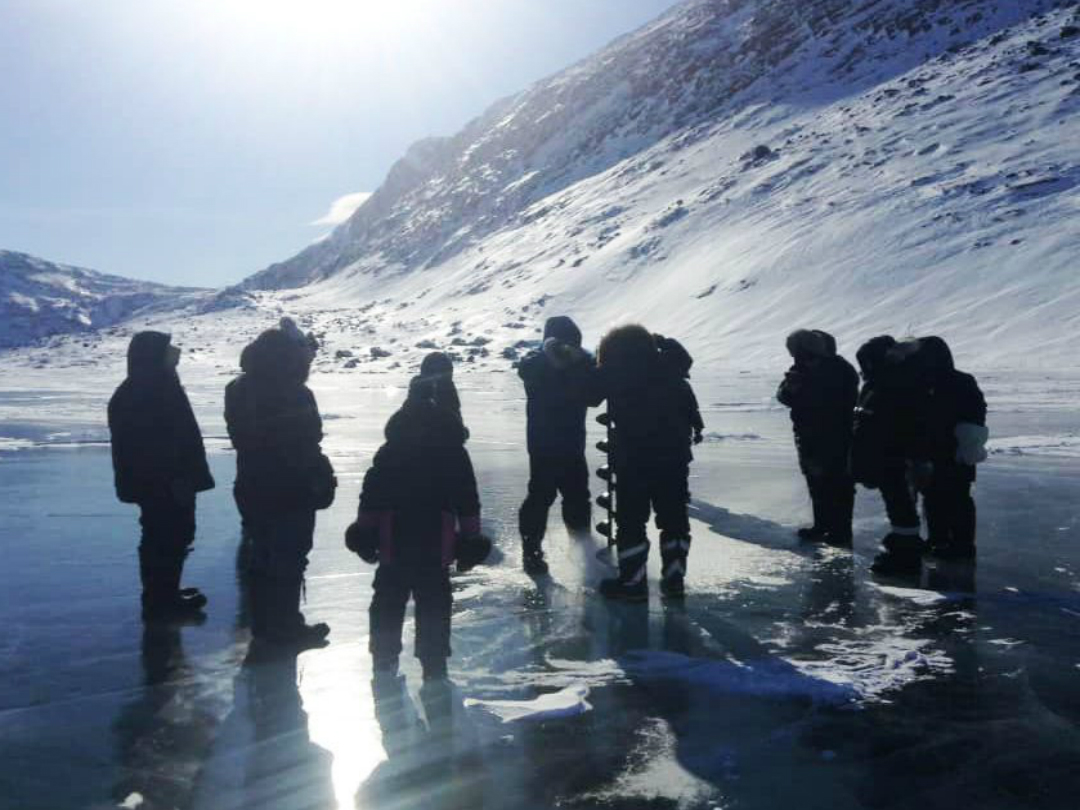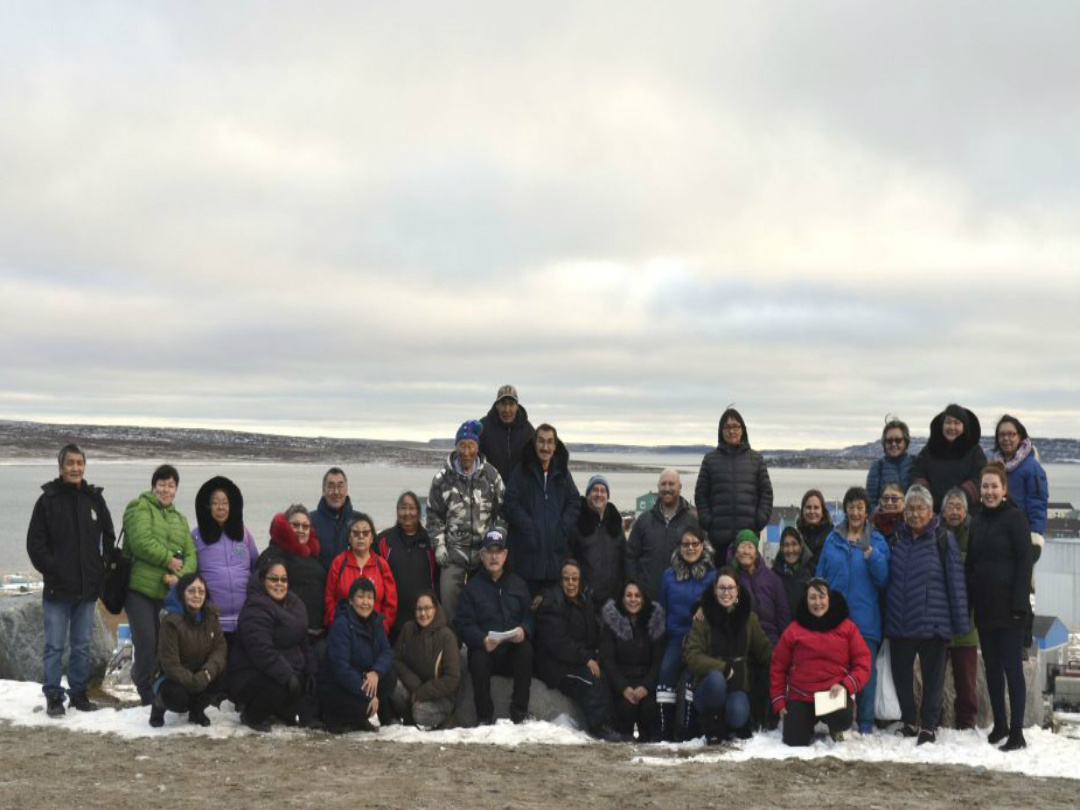Small towns, big changes:
Gladue report access in Nunavik, Que.
By Cora Hansen and Travis Poland

Clients participating in traditional activities as organized by Makivik’s justice coordinator in Kangiqsujuaq. [Photo courtesy of Paul Palubeskie]
A group of small communities in Northern Quebec have stood out as models in recent years of how to successfully incorporate alternative sentencing options for Indigenous offenders to keep them out of prison.
Since 2014, communities in northern Quebec’s Nunavik region have implemented sentencing options for Indigenous people into their everyday operations.
The Nunavik region, which is home to 18 per cent of the the Inuit population in Canada, is served by travelling courts and trained consultants travel the communities to write historical reports about offenders so that judges can take them into account when sentencing.
The consultants are known as Gladue writers, named after a 1999 Supreme Court of Canada ruling that there must be special considerations when sentencing Indigenous offenders.
This introduced Gladue reports to the legal system. Named for Jamie Gladue, the young woman whose case brought on the changes, Gladue reports outline an Indigenous individual’s history and explain how Indigenous people face systemic racism and discrimination and their inter-generational effects of colonialism.
Since their inception, Gladue principles have been inconsistently applied across Canada. Complaints include uneven report quality, difficult access, and lack of education in the legal community.
One standout of apparent success in the Nunavik region is Kuujjuaq, an Inuit community of 2,750 that has taken big steps toward incorporating Indigenous considerations in the legal framework, including Gladue reports, in hopes of building a strong community.
“Gladue makes a big difference in our community,” says Phoebe Atagotaaluk, a coordinator with Kuujjauq’s justice committee.
Atagotaaluk said the community justice committee, aside from helping with Gladue reports, arranges restorative justice activities like traditional sewing — which can provide free parkas to the community — and hunts with community elders who can provide knowledge and guidance.
Kuujjuaq, like other communities in the region, is served by travelling, itinerant courts. A judge and other legal professionals fly into the community for trials and sentencing hearings.
The travelling court visits larger Nunavik communities such as Kuujjuaq about once a month and smaller communities could see a court visit about three or four times a year. The court’s timeline aligns with the approximate time it takes to produce a Gladue report, according to Paul Palubeskie of the Makivik Corporation, which provides legal representation for the Inuit population in Quebec.

Makivik Regional Justice Committee meeting in Inukjuak in October, 2018. The people in this photo represent all of the justice committees in Nunavik.
Not all representatives are seen in this photo. [Photo courtesy of Paul Palubeskie]
“We’ve managed to work very well with the travelling courts,” says Palubeskie.
The Makivik Corporation operates justice committees in 11 of Nunavik’s 14 communities. The committees work with residents providing everyday legal assistance, Gladue reports, and access to restorative justice programs. The corporation employs Gladue writers throughout the Nunavik region.
Palubeskie said having writers familiar with communities like Kuujjuaq, where Statistics Canada reports nearly 78 per cent of people identify as Indigenous, helps produce quality reports.
Currently, three of Makivik’s Gladue writers live in northern communities, three consultants travel north to complete report interviews, and one works within Makivik’s Montreal office.
While not every Nunavik community has a Gladue writer, Palubeskie said when writers visits communities, they work closely with justice committees to learn about the village’s circumstances.
David Milward, a law professor at the University of Victoria and co-author of The Gladue Handbook, says the best Gladue reports are done by writers who understand an offender’s community.
“It’s beneficial, but it’s not always possible,” he says, adding there are times when a Gladue writer has to interact with a community with which he or she has no previous experience because not every community has its own writer.
“You have to build a rapport with verbal, in-person discussion, you can’t always do that sort of thing over the phone,” says Milward. “You actually had to go out to the community and make a real effort to learn about it.”
Louisa Qaurritaiyuk, who works with justice committees in Nunavik, often attends court cases and says judges have been accepting of Gladue reports.
Quarritaiyuk says having a Gladue report done can be life-changing for people, especially individuals who have been in and out of jail.
“It’s really good when you see them, it can be overwhelming,” said Quarritaiyuk. “They go through Gladue and you see them in our community more happy and awake.”
The restorative aspects of a Gladue report have been well noted, according to a 2016 report on the Nunavik’s justice committees done by Lyne St. Louis, justice officer with the Makivik Corporation and Vivien Carli, a former program manager with the corporation.
A Gladue report can be “restorative, rehabilitative, and encourages accountability and healing,” according to the report.
Furthermore, Makivik provides Gladue reports without charge. In other parts of Canada, Gladue reports can be funded by legal aid, or individuals can pay to have their report at a cost ranging from $1,000 to $7,000, according to Indigenous Legal Training Inc.
Milward says having people who produce Gladue reports as the main part of their job can also lead to better reports.
“Even if they are good glad to report writers their jobs are pulling their cognitive abilities and attentive focus in multiple directions,” Milward says.
He says communities can always learn from one another but he’s hesitant to suggest something like a national Gladue framework, as local needs vary.
“First Nations have different needs different ideas, and different experiences,” Milward says. “So sometimes the process has to be more localized and a Gladue report writer might have to adjust his or her procedure.”
However, the absence of a national framework, puts “an onus on individual provinces to implement, Gladue report writing in a meaningful way.”